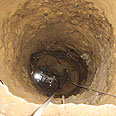
Gaza tunnel (archives)
צילום: דובר צה"ל
Defense officials: Economic pressure on Gaza becoming ineffective
Despite blockade imposed on Gaza, 150,000 liters of diesel oil poured into Strip through pipes located under Philadelphi route, while tunnels turn into freeway of goods, essentials
Gaza's residents are no longer dependant on Israeli diesel oil, as the fuel flows from Egypt to the Strip through pipes located under the Philadelphi route.
This is another stage in Gaza's disengagement from its dependency on the State of Israel. Defense officials have admitted that the economic pressure, exerted by Israel on the Strip through the siege and the limitation of goods allowed to enter Gaza, is growing weaker and that today the Palestinians find alternative sources for their energy and goods supplies in Egypt.
Israel has so far transferred 120,000 liters of diesel oil into the Gaza Strip on a daily basis. In the recent days, however, the Hamas government conveyed a message to the Jewish state that it no longer plans to continue buying fuel for vehicles, at least not at the extent it used to purchase in the past.
It turns out that 150,000 liters of diesel oil are poured into the Strip every day through pipes built in the tunnels under the Philadelphi route. Thus, Gazans are no longer dependant on the expensive Israeli diesel oil, whose only advantage is the quality of its refinement.
As there is no direct contact between the Israeli government and the Hamas government, there is a communication channel in terms of fuel supplies between a Gazan businessman and Israel's Dor Energy company.
The Palestinian contact has informed the Israeli company that he wants to stop purchasing the expensive Israeli diesel oil due to the drop in global fuel prices, but the real reason is that there is no longer a fuel shortage in the Strip due to the Egyptian alternative.
The large amounts of fuel accumulated in the Strip have dropped the price of a liter of diesel oil in Gaza to NIS 1-2 (about 26-52 cents) per liter, less than half the price in Israel.
Hamas establishes 'tunnels administration'
This was not the case up until several months ago. As part of the economic pressure on the Palestinians, Israel limited the amounts of diesel fuel entering the Strip, leading to a significant fuel shortage.
Drivers began fueling their cars with cooking oil and various alternatives, and at a certain stage Gaza began "traveling in carts and riding donkeys," as defined by Israeli sources.
However, since the start of the ceasefire, Hamas authorities have taken things into their hands. They gained control of the tunnels, declared the establishment of the "tunnels' administration" and began building pipes and fuel pumps.
Sources in the defense establishment note that in the next stage Gazans plan to transfer gas through underground pipes from Egypt to the Strip.
According to calculations carried out in Israel, in order to maintain a reasonable fabric of life in the Gaza Strip and prevent hunger, at least 110 trucks filled with goods are needed a day.
In recent months, however, between 80 to 90 trucks cross into the Strip every day, mainly carrying necessities. The reason is a drop in the demand, as Gaza receives continuous supplies through the tunnels.
The Gaza Strip has been under a complete blockade for the past four days due to the recent rocket fire, but hardly anyone is complaining about a shortage, including international organizations. It appears that the economic pressure is no longer as effective as Israeli officials believe.
Even the humanitarian crossings to Gaza are only operating in a symbolic manner. More and more residents in need of medical care, which the Palestinian health system is unable to provide, are traveling to Egypt for that purpose.
Today the Erez crossing serves only some 20 humanitarian cases a day. Most of those who enter Gaza through the crossing are a few dozens of diplomats or foreign journalists.
'Smuggling everything apart from iron'
The tunnels industry in Rafah has been flourishing since the truce went into effect in June. Nearly everything passes through the tunnels: Cigarettes, toys, electric appliances, clothes and shoes, spices, vehicle spare parts and even sheep and calf for slaughter purposes.
Omar Shaaban, an economist from Gaza, estimates that some 90% of the market activity in Gaza is carried out through the tunnels. According to him, the goods' movement generates between $30 and $40 million a month.
"Our only problem is cement, iron and gas, which we have not managed to smuggle yet," says Azat Nijam, a merchant from Gaza. "The gas in the pipe is freezing in the tunnel, but we will overcome this as well."
About a month ago, two non-metallic pipe lines were placed in the tunnels, and diesel oil flows through them from Egypt to the Gaza Strip. The fuel is used for vehicles, industry generators and for the operation of water pumps of private wells.
"The Gazan market is flooded with fuel from Egypt for the price of NIS 2 per liter," says Mahmoud Shawa, chairman of the petrol stations' association in the Strip.
According to him, the Egyptian diesel fuel is of poor quality but can be used, particularly for trucks. "The Egyptian fuel is not clean, so there is no demand for it in Gaza."
The tunnel economy takes the burden of worrying for the welfare of Gaza's residents off Hamas' shoulders. The economic distress is not what it used to be, there is hardly any shortage in goods, and in cases of financial distress the Hamas government provides financial aid and necessities.
Ronny Shaked contributed to this report










